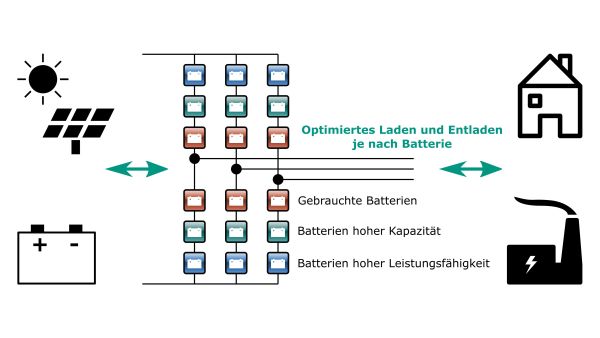
The main idea of the LeMoStore project is to flexibly combine different energy storage technologies and to connect battery modules to the power grid via a grid-compatible inverter. For this purpose, Karlsruhe Institute of Technology (KIT) collaborates with partners from science and industry. LeMoStore aims to achieve a maximum service life of battery modules and stable power supply with a high share of renewable energy sources. LeMoStore is funded by the Federal Ministry for Economic Affairs with about EUR 1.7 million.
The share of renewable energy sources in the power supply mix is increasing. As solar and wind power fluctuate as a function of time and weather, powerful energy storage systems are required in the public grid to ensure stable supply. Conventional concepts with established technologies, such as lithium-ion accumulators, combine many battery cells in a large energy storage system. Similar to photovoltaic facilities, the latter is connected to the power grid via an inverter, an electronic circuit that converts direct into alternating current.
Charge and Discharge Capacities Are Divided
The research project "Service Life-optimized Integration of Modular Energy Storage Systems in the Grid," LeMoStore for short, pursues an entirely new approach. Several small battery modules based on different storage technologies are combined flexibly and efficiently connected to the power grid via a grid-compatible inverter. "Charge and discharge capacities are strategically divided to achieve a maximum service life of the battery modules and, at the same time, meet the specific requirements for use of a power grid," says Professor Marc Hiller, Member of the Board of KIT's Institute of Electrical Engineering (ETI).
KIT's partners in LeMoStore are Aschaffenburg University of Applied Sciences (TH AB) and the companies of BMZ Germany GmbH and BATEMO GmbH. Associated partners are HBK - Hottinger Brüel & Kjær GmbH, Linde Material Handling GmbH, KION Battery Systems GmbH (KBS), and Mainsite GmbH & Co KG. The project started on June 01, 2021 and is scheduled for a duration of three years. LeMoStore is funded by the Federal Ministry for Economic Affairs and Energy (BMWi) with about EUR 1.7 million.
"We are developing a modular kit of novel power electronic storage blocks (PESB) to individually combine battery modules and achieve high flexibility," says Professor Marc Hiller, KIT. For this purpose, researchers use a so-called modular multilevel converter (MMC). It consists of a number of power electronic blocks. The battery modules integrated in the MMC cells are in the focus of research at the Laboratory for Power Electronics and Electric Machines of TH AB. Thanks to smart interconnection and control of the PESB, the converter system can efficiently convert direct into alternating current and vice versa. Moreover, the desired power consumption and output of the battery modules can be controlled precisely. In this way, already used battery modules (from electric vehicles) can be applied without having to reduce the performance of the system. Researchers on Campus South and Campus North of KIT develop the control system and an optimized energy management scheme for this purpose. BMZ Germany GmbH is responsible for the selection, testing, and dimensioning of the chemical storage cell for the battery module. BATEMO GmbH develops a battery model that considers the current state of charge and increasing aging of the batteries for economically efficient operation of the system. Linde Material Handling GmbH, KION Battery Systems GmbH (KBS), and Mainsite GmbH & Co. KG optimize this mode of operation of modern energy storage systems for industrial use.

Demonstrator Is Tested at Energy Lab 2.0
Scientists model an integrated system to determine optimum energy distribution in real time. Within the framework of the project, the system is implemented in the form of a demonstrator. For testing, they use the Power Hardware in the Loop (PHIL) infrastructure of KIT's Energy Lab 2.0. PHIL emulators can be used to model AC grids of up to 1 kV and DC grids of up to 1.5 kV. By simulating the realistic grid environment in the PHIL test environment, researchers can test the LeMoStore demonstrator in any modes of operation and validate and verify its functions. The precise and highly dynamic measurement technology required is supplied by HBK - Hottinger Brüel & Kjær GmbH.
By testing options of an optimized interaction of storage and converter technologies using established hardware, the LeMoStore project will not only reveal additional potential of lithium-ion batteries in grids, but also contribute to solutions for the energy transition.
More information in German on the project: https://www.lemostore.de/
More information on Energy Lab 2.0: https://www.elab2.kit.edu/english/index.php
More about the KIT Energy Center: https://www.energy.kit.edu/
Being "The Research University in the Helmholtz Association", KIT creates and imparts knowledge for the society and the environment. It is the objective to make significant contributions to the global challenges in the fields of energy, mobility, and information. For this, about 9,600 employees cooperate in a broad range of disciplines in natural sciences, engineering sciences, economics, and the humanities and social sciences. KIT prepares its 23,300 students for responsible tasks in society, industry, and science by offering research-based study programs. Innovation efforts at KIT build a bridge between important scientific findings and their application for the benefit of society, economic prosperity, and the preservation of our natural basis of life. KIT is one of the German universities of excellence.






